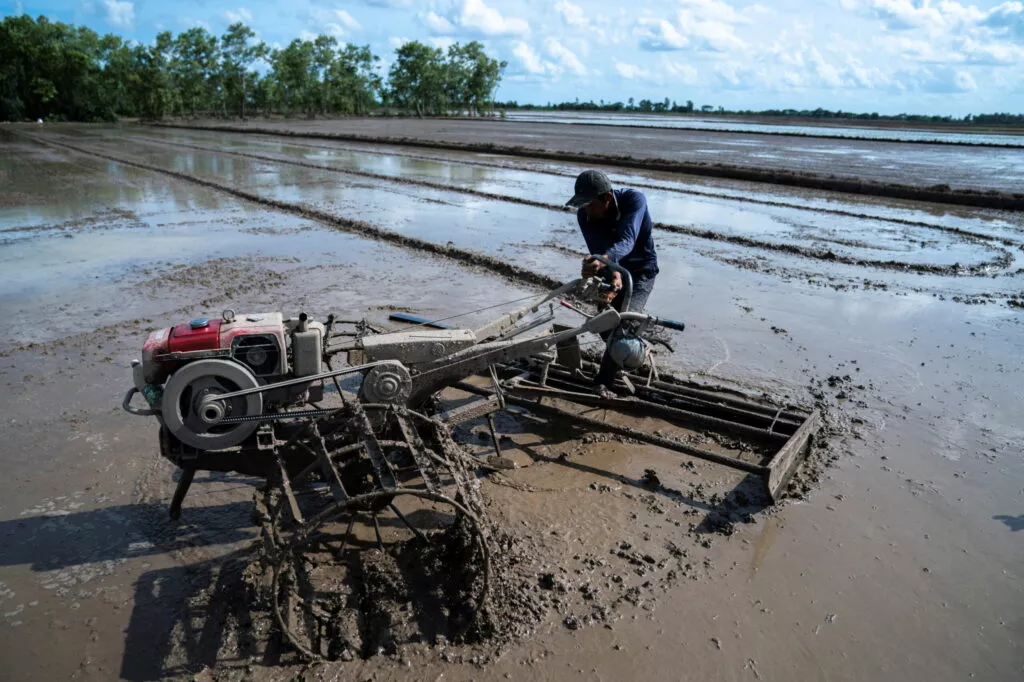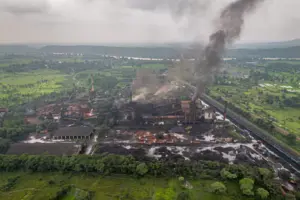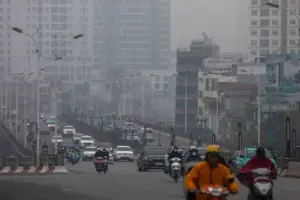Traditional ecological knowledge is under threat in the Vietnamese Mekong Delta
Traditional ecological knowledge (TEK) is a living body of knowledge that evolves through experimentation, learning and interaction with environments. It plays a vital role in supporting resource-based livelihoods of rural communities and is valued across diverse cultural contexts. But some argue that TEK is less useful in the context of changing waterscapes and technological development in the Mekong region.
In the Vietnamese Mekong Delta, TEK is seen as a valuable shared asset. It shapes ways of life, norms, values and the ‘living with floods’ cultures of rural communities. Local narratives of adaptation show how TEK has evolved through communities’ profound interactions with water environments and their everyday livelihoods.
Fish trap making illustrates this process well. Makers develop ecological understandings of flood systems and fish behaviours and embed these philosophies into the crafting of the fish traps. Each trap is designed for a specific fish species that lives in certain habitat conditions. Fishers acquire and share such knowledge in their fishing activities, showing how TEK is collectively produced and widely disseminated within rural communities to support livelihoods and address environmental challenges.
While TEK is inextricably connected to the sociocultural practices of the Mekong inhabitants, it now faces a high risk of erosion. Rural communities are shifting away from TEK and pursuing alternative options to sustain their livelihoods. Primary triggers include transboundary and local effects of climate change, transformed flood-scapes, the growing commodity-based agricultural economy and the breakdown of knowledge transmission due to out-migration.
Changes in the Mekong’s flood patterns have made TEK-based observations and predictions less accurate or even obsolete. The traditional knowledge that ‘floodwaters flow over riverbanks in mid-July’ is no longer reliable for predicting flood conditions in the floodplains.
The expansion of dykes and widespread multi-cropping production systems have greatly reduced water retention in fields, canals and rivers, diminishing habitats for fish. The overuse of agrochemicals in rice fields has also led to the depletion of wild fish stocks. Fishers have abandoned traditional fishing methods and switched to destructive devices to catch more fish, causing sharp declines of wild fisheries across the delta.
Agrarian transitions are accelerating the transformation from traditional farming to commodity-based agriculture and value chain integration in the Vietnamese Mekong Delta. These agricultural modernisation processes have made farmers more reliant on scientific knowledge and reduced their use of TEK. Large-scale rice farmers now utilise drones to spray pesticides, finding them more efficient and convenient than traditional farming tools such as hand pumps, which are more time-consuming and labour-intensive. But in some peripheral areas of the Vietnamese Mekong floodplains, TEK is still used by farmers in cultivating floating or deep rice and combined with modern agricultural technologies for rice harvesting.
TEK erosion is also linked to rural–urban migration. Rural migrants leave farming, which is labour-intensive and precarious, in search of more secure livelihoods. Out-migration weakens family ties and cuts off the transmission of TEK-based farming methods to younger generations, leaving the question of who will tend the farm in the future unresolved.
While TEK is increasingly marginalised, there is a sense of regret over its erosion. This is closely linked to the gradual discontinuation of nature-based livelihoods long practised by rural communities.
But some see this as an opportunity for obsolete or no-longer-useful knowledge to be removed from existing systems while stimulating the evolution of innovative and adaptable practices to better support community resilience. This involves collective efforts in creating new forms of TEK or revising existing ones by learning from nature and fostering rural innovation.
The role of TEK remains significant and should be respected. Preservation of TEK is essential. This can be done through collective memory, such as family gatherings where community members reflect on how TEK fosters livelihoods and helps communities respond to increasingly unpredictable environmental conditions. Such practices help retain TEK in local knowledge systems while preserving community memories of engagement with local environments over time.
It is important to engage youth with local community members, especially the elderly, so they can learn how ‘living TEK’ operates on the ground and supports adaptation in the rural delta. TEK should also be integrated into the delta’s climate-resilient and sustainable development strategy, known as the ‘living with nature’ approach. It highlights how rural communities have ingeniously learned to adapt by ‘harnessing nature to deal with nature’, and how they serve as custodians of TEK in navigating adaptive pathways in the longer term.
Thong Anh Tran is Honorary Lecturer at Fenner School of Environment and Society at the College of Systems and Society at The Australian National University.
Duong Van Ni is Chairperson and Director of the Mekong Conservancy Foundation.
Source: East Asia Forum





